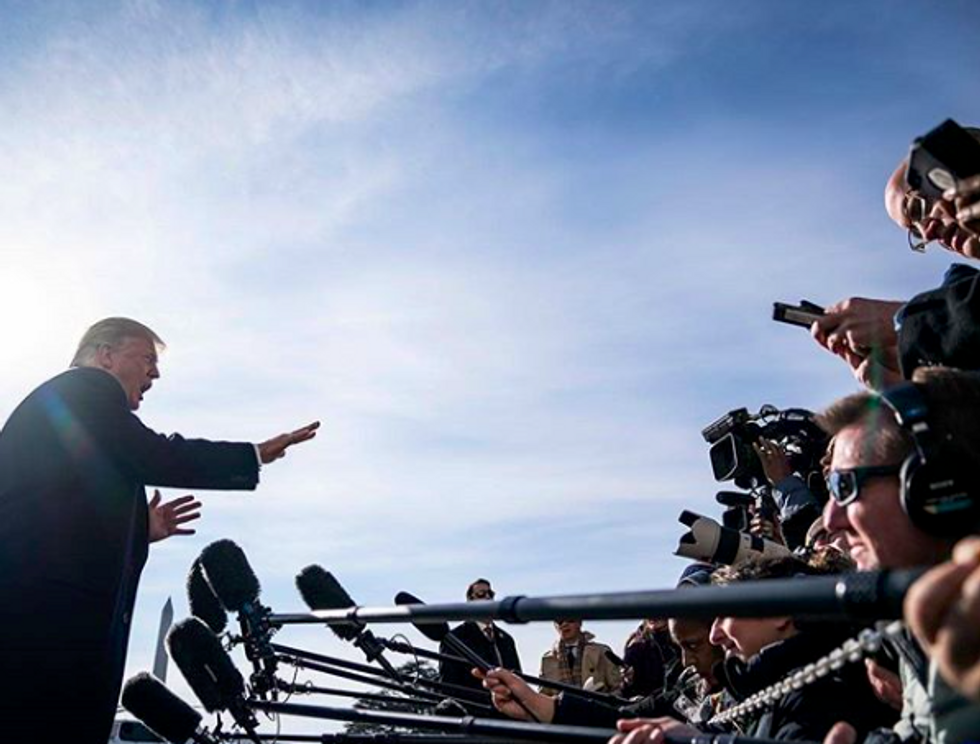On December 16, during his nightly Hardball show, MSNBC's Chris Matthews speculated that President Trump would resign in the coming weeks. Matthews suggested that the unpopular president might take the fall to ensure his children, Ivanka and Donald Trump Jr., could be acquitted of all charges in Special Counsel Robert Mueller's investigation.
Although this outcome seems far-fetched given the rarity of White House resignation (the last president to do so was Nixon), the overwhelming amount of scandal surrounding the Trump administration suggests the President may not finish a full term. At the moment, nearly everything tied to Trump is under investigation: his organization, his campaign, and his foundation, just to name a few. Perhaps the most pressing danger to Trump, Mueller's investigation into Russian interference in the 2016 investigation, has become even more of a threat in the past few months, with the indictment of three former advisors.
George Papadopoulos, a foreign policy adviser whose greatest qualifier for the job was a brief stint on his high school's Model UN team, was the first aide to go back in October of 2017. Papadopoulos pleaded guilty to making false statements to the FBI about his knowledge of Russian "dirt" on Hillary Clinton. He received a 2-week sentence.
Following Papadopoulos, there was Paul Manafort and Michael Flynn; the latter was indicted on 25 different counts by Mueller, most of which is dealing with his connections to Ukrainian politicians. Most recently, and perhaps most shockingly, was the arrest and sentencing of former Trump lawyer Michael Cohen, who faces a three-year sentence in prison beginning March 6.
Mueller first began his investigation of Cohen, dubbed Trump's "fixer," back in 2017, but handed it over to the US Attorney's office for the Southern District of New York shortly after. At first, Cohen struck a deal with this office, pleading guilty to eight counts of finance-related charges. Among these charges were violations of campaign finance laws on behalf of Trump, who coordinated with Cohen on hush money payments to Karen McDougal and Stormy Daniels, two women who claimed they had an affair with Trump prior to his campaign.
In November, Cohen struck a plea deal with Mueller when he disclosed the details of a potential Trump Tower in Moscow, a real estate venture that never came to fruition but nonetheless involved the Russian government. Even this deal couldn't save him from jail time.
It's worth noting that although these have been the most high-profile consequences of the Russia investigation, a total of thirty-three people have been indicted by or have plead guilty to Mueller -- including thirteen Russian citizens. If the arrest of a few advisers doesn't seem significant to you, that fact should make you think twice about the state of Trump's affairs.
The litany of investigations and lawsuits facing Trump brings us back to the original question: will Trump resign anytime soon? The answer may rely on how much immunity he has from the legal situations that surround him. Unfortunately, the extent of this immunity is unclear, given the lack of legal writing on presidential crimes. The Constitution does not say whether or not a president can be charged with crimes, though a recent opinion from the Department of Justice asserts that sitting presidents cannot be indicted. Additionally, sitting presidents cannot be sued for official actions taken while in office, but personal and unofficial actions can be sued in a federal court. And let's not forget about the presidency's unlimited pardoning powers.
All in all, it's hard to bring a president to trial, and even harder to send them to jail. So maybe Trump isn't scared of his illegal past catching up to him, and maybe he won't find it necessary to resign. This decision would seem to fit his ego. But there's always the threat of impeachment, a possibility that's been brought up by eleven members of Congress and has support from 40% of Americans. Could this prompt resignation?
In any event, Trump remains the most unpopular US president to date. His approval ratings continue to reach new lows, and his frequent Twitter outbursts never cease to invite widespread criticism. Even if he doesn't resign, Trump's many legal battles ensure that he will never be held to the same standard as his more "presidential" predecessors.












